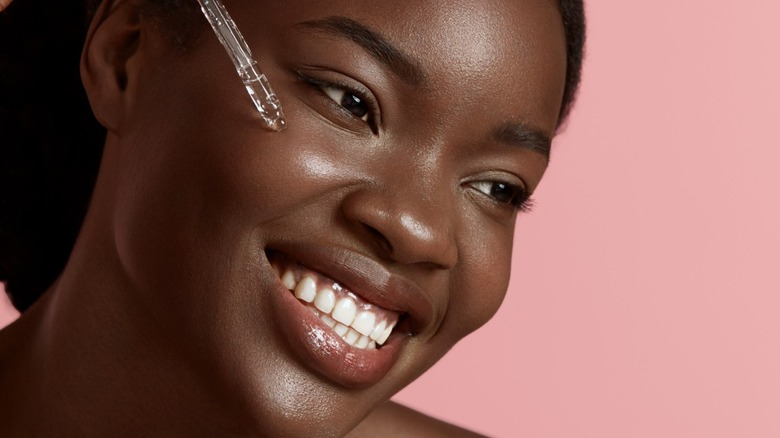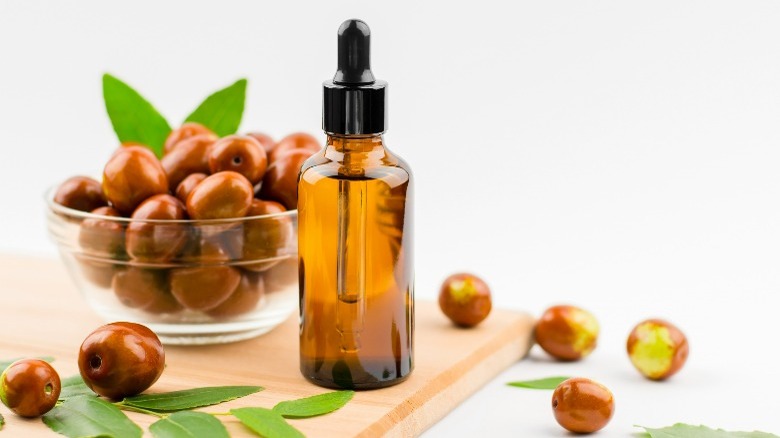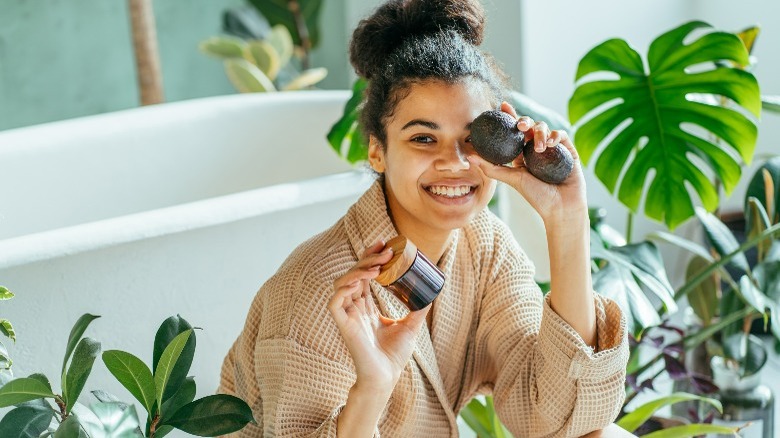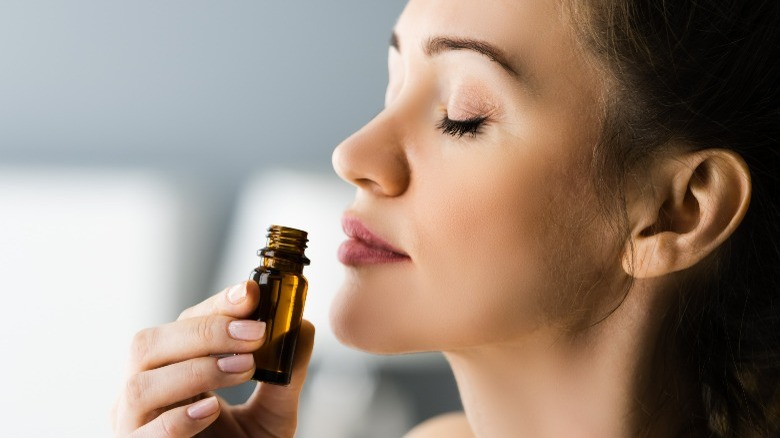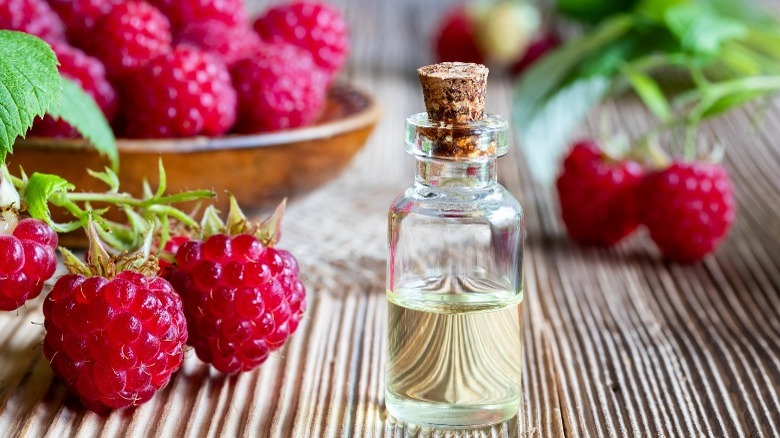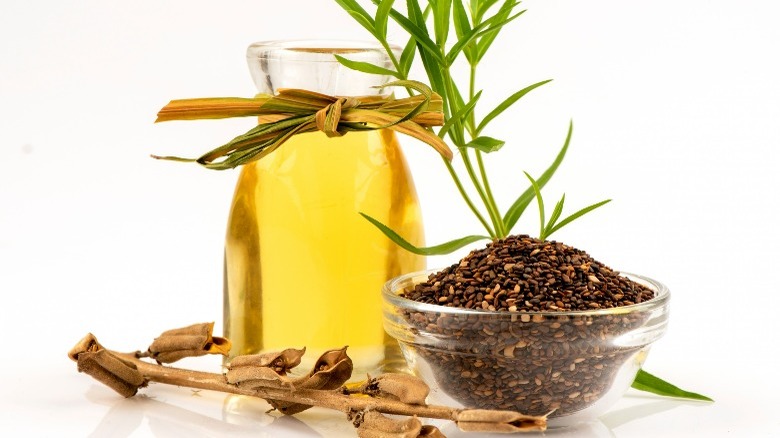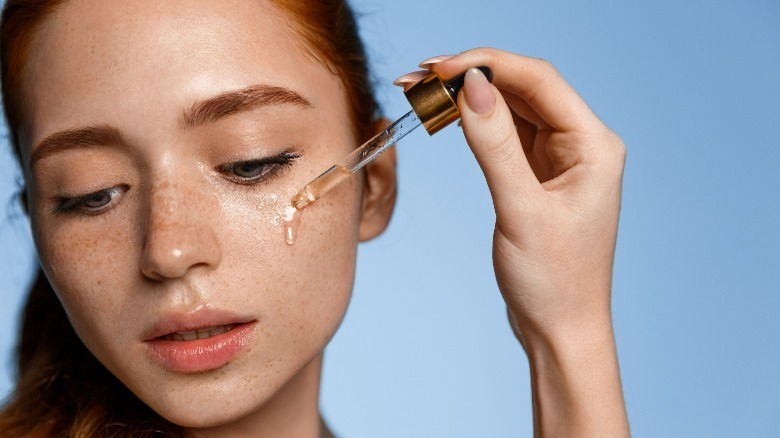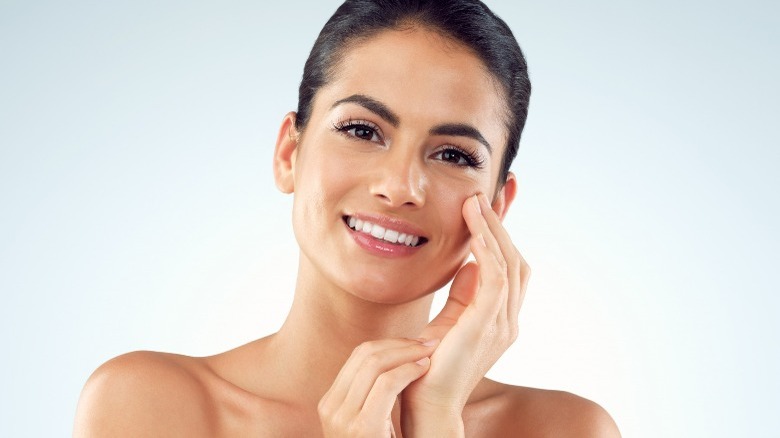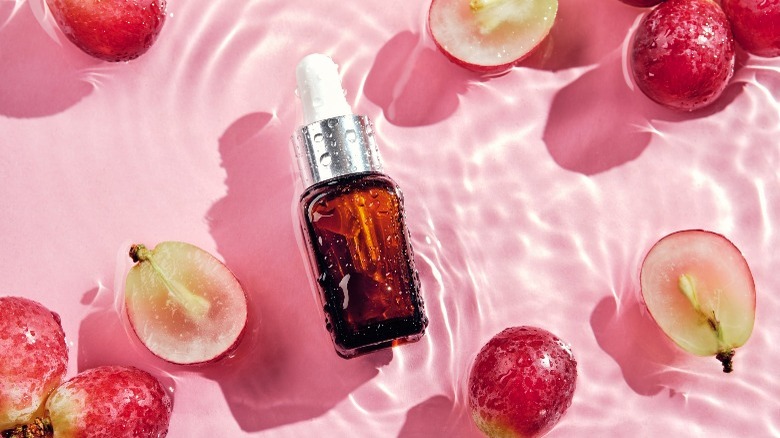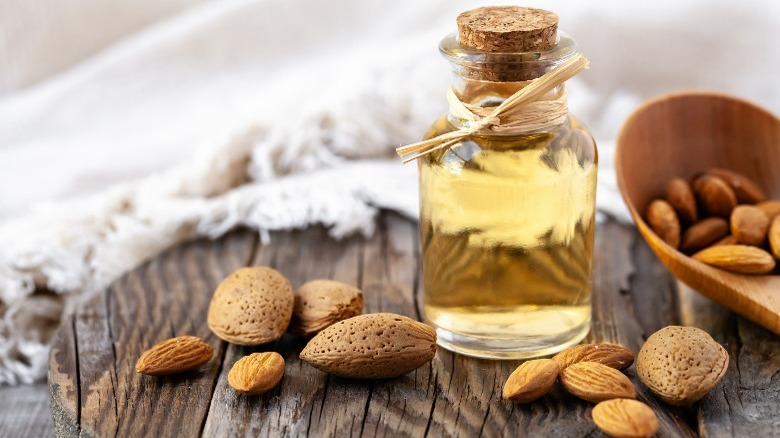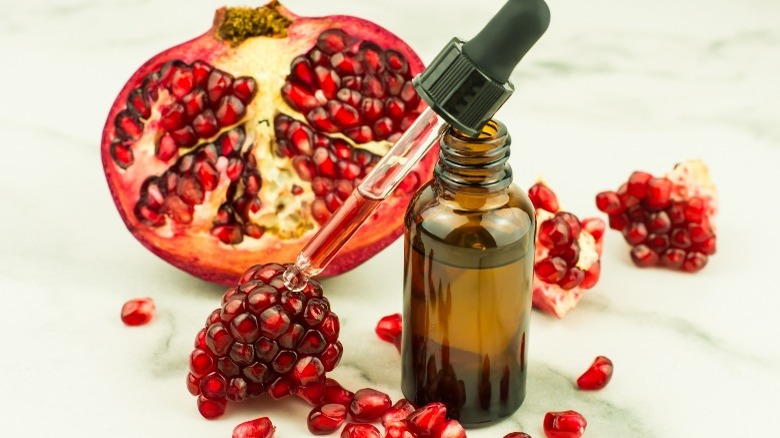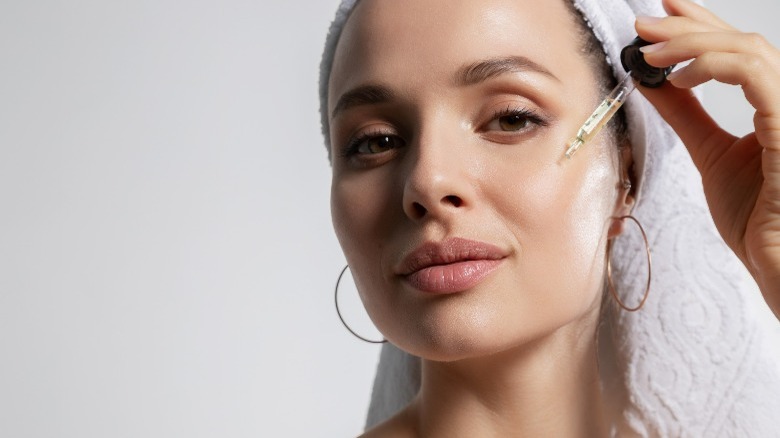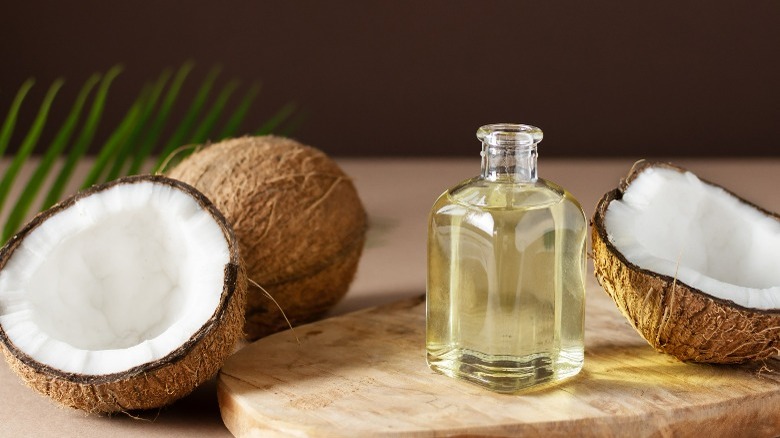The Best Facial Oils For Dewy Skin
The skincare trend that never seems to die is the "glass-skin" look — internet-speak for skin that is so luminous as to appear airbrushed (cue Hailey Bieber's sun-kissed, ultra-dewy complexion). While we all have different skin concerns — some requiring more treatment and attention than others — the good news is that there's one face product that is your hero when it comes to bringing a dull complexion back to life: face oil. If you haven't jumped on this bandwagon yet, it's time you do, because, fortunately, there's a face oil for every skin type (yes, even acne-prone), and it could be the one game-changing face product you never realized you were missing.
But first, some ground rules. Think of face oil as the glaze of your skincare regimen. Given that face oils are, well, oil-based, they sit on top of the skin, and thus do not hydrate by themselves. Instead, they work with your moisturizer to keep its water-based ingredients locked in, as dermatologist Diane C. Madfes explained to Self. So, make sure to add face oil after your moisturizer. Next, find out what skin type you have — oily, dry, combination, sensitive — so that you can choose the best face oil for your skin's needs.
As for the best face oils that will give you that just-had-a-facial glow, we've done the hard work for you. Read on to find which natural face oil is a must-have in your daily skincare routine.
Jojoba oil is a great go-to for all skin types
This multipurpose face oil has long been an all-around favorite of skincare experts, and for good reasons: It's naturally antibacterial, antifungal, antiviral, analgesic (i.e., relieves pain), and anti-inflammatory, according to Byrdie. Additionally, as a 2017 study in the International Journal of Molecular Sciences found, it helps promote wound healing and repairs the skin barrier, a boon to acne-prone skin types and chronic face pickers — and let's be honest, haven't we all, during our most skin-addled years, gone to battle with a few zits?
But what really makes jojoba oil a standout is its ability to mimic the skin's natural sebum production. Wait a second, you might be thinking. Isn't sebum oil? Well, yes. It's the substance produced by your skin's sebaceous glands. However, your skin needs natural oils to stay moisturized; otherwise, your sebaceous glands kick into overdrive and produce more oil, potentially causing acne (per Healthline). Jojoba oil, with a similar molecular structure to sebum, can help balance the skin's pH and oil production, which means less irritation and fewer blemishes.
As with most face oils, it's best to opt for organic when possible. Unlike oils derived from conventionally grown plants, organic face oils will not contain chemical additives and other harmful ingredients that could irritate the skin (per Good Housekeeping).
Yes, argan oil lives up to the hype
Known for giving hair a lustrous sheen, argan oil is also a star skincare ingredient when it comes to achieving that coveted ever-youthful glow. Extracted from the argan trees native to Morocco, argan oil comes with a host of skin-health benefits. Most notably, it's suitable for all skin types, and ranks zero (yes, zero!) on the comedogenic scale, meaning your pores can breathe free and easy (per Bustle). Loaded with omega fatty acids and vitamin E (a fat-soluble antioxidant that retains water), argan oil acts as a super-hydrator — allowing your moisturizer to penetrate deeper and lock in its skin-loving ingredients to keep your skin glowing longer (per GQ). "It's essentially nature's protective, nourishing superfood for your skin," Josie Maran, whose skincare line boasts argan oil as the key ingredient, told Marie Claire.
Along with moisturizing your skin, argan oil contains antioxidants that help soothe inflammatory skin conditions like eczema, psoriasis, and rosacea, per GQ and Marie CLaire; fade stretch marks and scars; and combat free-radical damage caused by the sun. Of course, with any medical-related skin concerns, it's best to consult your dermatologist before implementing a product into your daily regimen. But if you're simply looking for a radiance boost, argan oil might be the MVP in your skincare lineup.
Avocado oil is your skin's best friend
As if we needed another reason to love avocados! The abundance of fatty acids and vitamin C from this delicious fruit doesn't just keep you healthy on the inside, but on the outside too. While vitamin C is an antioxidant that neutralizes toxins on your skin, fatty acids act as an anti-aging elixir, notes Elle UK. Over time, we lose collagen and protective fatty layers in our skin that combat moisture loss and keep us looking younger. An essential oil's ability to act as a humectant, meaning it prevents moisture loss, is key to attaining a glowing complexion. As nutritionist Gabriela Peacock told Elle UK, "Using [avocado oil] topically can allow the oils to soften and hydrate the skin from the outside, making it appear plumper and brighter." And who doesn't want plumper, brighter skin?
Another quality that makes avocado oil a heavyweight in the cosmetics sphere is its effectiveness in helping melanin-rich skin tones stay hydrated. "Studies have shown Black and Brown skin types have more cell layers with more cell cohesion which could impede product penetration," explained board-certified dermatologist Dr. Farhaad Riyaz to Byrdie. Additionally, darker skin types tend to produce more natural oils. Riyaz thus recommends non-comedogenic, emollient-dense moisturizers, like avocado oil.
Evening primrose oil can help you combat skin irritation while making your skin glow
Aside from its romantic name, evening primrose oil (EPO) contains several alluring benefits that make it a must-have in your skincare arsenal. Dealing with pesky skin conditions such as dryness or redness? This multipurpose oil has you covered. Packed with omega-6 essential fatty acids, including linoleic acid and gamma-linolenic acid (GLA), this glow-boosting oil helps soften and moisturize the skin while reducing inflammation — making it ideal for people with eczema (per Byrdie). Our bodies don't naturally produce certain fatty acids like GLA, so it's important to find those nutrients from other sources, notes Glamour. Especially beneficial for dry, sensitive skin, EPO's high profile of fatty acids also helps prevent moisture loss when applied after a face cream or lotion.
But what makes EPO a perfect addition to any skincare routine is how well it complements other face products, even those targeted to combat acne, which can often be irritating and drying to the skin. Glamour also explains that blood thinners, antidepressants, and blood pressure medications can be affected by GLA, so make sure to consult your doctor before adding EPO to your skincare regimen.
Raspberry seed oil is a vitamin cocktail for the skin
If you're looking for a face oil that gives you the most bang for your buck, raspberry seed oil is it. This all-star ingredient contains high levels of antioxidants and fatty acids that help combat oxidative stress and reduce inflammation, according to Healthline. Rich in vitamins A, C, and E, it also aids in skin regeneration, fights free radicals (i.e., unstable molecules that cause skin damage, per Today), and replenishes collagen levels, all of which keep skin firmer, plumper, and (no surprise) healthier, states a 2021 study.
Add to this list of benefits that it doesn't clog pores and has been shown to protect against harmful UV rays (per a 2000 study in Food Chemistry), and you have the quintessential multitasker for your bathroom cabinet. Using products that offer such a wide array of therapeutic benefits is important to maintaining a youthful complexion. While we would all love luminous skin, prioritizing radiance over skin integrity could lead to disappointment, if underlying skin issues aren't first addressed. In other words, opting for medicinal products like raspberry seed oil, which targets multiple skin concerns in one shot, will help you achieve not just a celebrity-like glow, but keep your skin happy in the long run.
Sesame seed oil leads the pack in nutrient-rich skincare ingredients
With relatively little ability to clog pores, acne-prone skin types will love this light and silky oil. Indigenous to East Africa and India (via Healthline), sesame seed oil has been used for its restorative and moisturizing properties for centuries, according to Into the Gloss — it's even purported to be a favorite of Cleopatra's. Loaded with fatty acids and fat-soluble vitamins, this nourishing face oil penetrates deep into the skin to hydrate cells, without stimulating oil glands that cause acne. In fact, a 1989 study published in the Journal of the Society of Cosmetic Chemists found that refined sesame seed oil had a ranking of 1 on the comedogenic scale — which ranges from 0 to 5, with 0 not clogging pores at all and 5 clogging pores the most (via Healthline).
But moisturizing without the nuisance of pore-clogging isn't all this oil does. It contains vitamin E, which helps repair skin and protect it from environmental pollutants, as well as phenolic compounds, which combat aging and reduce skin inflammation. As Rinky Kapoor told HealthShots, sesame seed oil "repairs the damaged skin cells and the presence of fatty acids and vitamins reduce wrinkles, fine lines and enlarged pores. Polyphenols in the sesame seeds prevent the skin from getting the oily shine and restore the natural barrier balance." So, if you have oily skin but are hesitant to try face oils, sesame seed oil might be a great place to start.
Rosehip oil gives the ultimate glow
It doesn't seem possible for a face product to stave off wrinkles and acne, but rosehip oil's potent punch of vitamins, antioxidants, and fatty acids (including linoleic acid, in which breakout-prone skin types are often deficient, according to Cosmopolitan) does just that. Mona Gohara, associate clinical professor of dermatology at Yale School of Medicine, raved about rosehip oil's vitamin-rich properties to Good Housekeeping, calling it "an A.C.E., which means it's rich in three key vitamins — A, C, and E — which help with acne prevention and reduction by increasing skin cell turnover." She added, "Vitamin C is the queen of all antioxidants and adds hydration to skin." The magazine also notes that rosehip oil acts as an astringent, helping to tighten pores while also brightening the skin. The result: a dewy complexion that looks like it was misted by the springs in the Pyrenees.
In addition to plumping your skin and preventing breakouts, rosehip oil also reduces scarring, along with the appearance of other skin discolorations, and increases collagen and elastin production (per Everyday Health). So lauded is this beloved oil among skin experts that even celebs like Kate Middleton are fans. And, let's face it, having the Duchess of Cambridge's approval is the best possible endorsement.
Marula oil delivers a luxurious glow
Derived from the kernels of marula fruit, found mostly in sub-Saharan Africa, marula oil is rich in omega fatty acids that blanket the skin to lock in hydration, according to Byrdie. Marula oil also contains amino acids, including L-arginine and glutamic acid, that produce collagen and elastin to keep the skin supple and resilient (per Healthline). Moreover, its light texture easily glides over the skin, preventing that sticky, greasy feeling that makes you want to reach for the oil-blotting sheets.
However, marula oil probably isn't the best choice for acne-prone skin, given that it ranks fairly high on the comedogenic scale, notes Cosmopolitan. For everyday use, marula oil is recommended for those with parched skin in need of a healthy dose of hydration. Its antioxidant profile, which is higher than the much-celebrated argan oil, also infuses the skin with nutrient-rich ingredients — perfect for dry, sensitive skin types.
But oily-skin folks shouldn't despair — marula oil's antimicrobial and anti-inflammatory properties can work as a great spot treatment to help soothe an angry zit.
Grapeseed oil can bring dull, tired skin back to life
Wine isn't the only fabulous product to come from grapes. These antioxidant-rich fruits are also responsible for grapeseed oil. Packed with vitamin E and omega-6 fatty acids — two powerhouse ingredients in any skincare product — grapeseed oil helps fortify the skin barrier, reduce inflammation, and decrease signs of aging from free radicals, states a 2018 study in the International Journal of Molecular Sciences. According to Medical News Today, it can also potentially heal acne, lighten hyperpigmentation, and fade residual scarring from breakouts.
But let's get back to grapeseed oil's star ingredients: vitamin E and fatty acids. How do these nutrients turn a lackluster complexion into one that's Instagram-ready? Vitamin E replenishes vital lipid loss that comes with aging. These lipids help the dermal layers retain hydration and moisture, balancing the body's oil production and making skin look plump and radiant, per Prevention. Linoleic acid, an essential fatty acid found in grapeseed oil, also softens the skin for deeper penetration of moisturizing products, the site adds. And proper hydration equals happy, glowing skin.
Almond oil can help revitalize damaged skin and give you an enviable glow
The question is, what can't almond oil do? Rich in vitamin E, monounsaturated fatty acids, proteins, potassium, and zinc, this all-star natural oil moisturizes, reduces inflammation, evens skin tone, reduces irritation, and, to some extent, protects against UV rays. Almond oil, with its gentle and nutrient-dense properties, is also ideal for sensitive skin types, whose skincare options are limited, to say the least. "It is mild and hypoallergenic, so it is safe to use directly, even on sensitive skin," dermatologist Hadley King told InStyle.
Other beneficial ingredients included in almond oil are vitamins A and D. Vitamin A acts as a natural retinol, which can help with myriad skin issues, such as wrinkles, acne, hyperpigmentation, and inflammatory conditions like psoriasis (per Healthline). And since almond oil has a comedogenic rating of 2, per Harper's Bazaar, it has little chance of clogging pores — making it a go-to for all skin types.
Pomegranate seed oil: a miracle in a tiny package
These fruit seeds may be small, but they're mighty. Packed with antioxidants, micronutrients, and vitamins, pomegranate seed oil is a surefire way to get a glowing complexion, along with numerous other skin benefits. What makes this oil a standout? It's chock-full of the mother of all skincare nutrients: vitamin C, an antioxidant that, among other things, prompts cell turnover and regeneration (per Healthline). This natural bodily process of cell renewal is key to maintaining healthy skin and looking youthful. Times of India recommends cleansing your skin with pomegranate seed oil or crushing pomegranate seeds to make an exfoliating scrub. In whatever way you choose to apply this light and refreshing oil, it's bound to give you a boost of radiance.
Not to be outdone by some of the other multitaskers on our list, pomegranate seed oil also contains anti-inflammatory properties that reduce redness and flakiness, irritation, and mild facial swelling, thanks to its high concentration of fatty acids, per a 2015 article in Journal of the Science of Food and Agriculture. Additionally, according to a 2021 study published in Nutrients, pomegranate seed oil "has been shown to reduce UVB-induced oxidative stress and the oxidation of skin proteins, and also to improve the color of the skin and restore the glow of skin exposed to UV radiation."
Sea buckthorn oil may be the hero skincare ingredient you've been missing
Though not as well-known as, say, jojoba oil or argan oil, sea buckthorn oil offers a powerhouse of potent antioxidants and nutrients that could make even the most lusterless complexion glow. Among its numerous skin-nurturing benefits is its high profile of vitamins, omega-7 fatty acids, and carotenoids that work together to fight aging. "It has been found that sea buckthorn plant berries carry 10 times more vitamin C than an orange and are the third-highest source of vitamin E among plants," Marisa Garshick, a board-certified dermatologist, told Byrdie.
Not only does sea buckthorn oil keep wrinkles and saggy skin at bay, it can reduce inflammation from skin conditions such as acne and psoriasis, thanks to a well-known fatty acid called linoleic acid, according to a 2017 article in Lipids in Health and Disease. Additionally, as Garshick explained to Byrdie, linoleic acid "is found naturally in the sebum, so it may help to regulate moisture levels and overall help with hydration." Which is to say, sea buckthorn oil could be a game changer in getting that sought-after glass-skin look.
Hemp and CBD oil are the latest and hottest glow-inducing products
Though these two relative newcomers to the skincare fold have sparked some debates among experts, they are still revered for their manifold healing properties. The difference between hemp and CBD oil is that hemp oil is derived from the seeds of a hemp plant, while CBD comes from the leaves, according to Allure. Are hemp and CBD oil legal in all 50 states? Yes. Will they get you high? Definitely not, as they lack THC, the compound in cannabis that makes you feel stoned. What you can expect, however, is a flawless complexion.
Hemp oil, Allure notes, has incredible moisturizing and skin-smoothing properties. Wrinkles be gone! As Joshua Zeichner, director of cosmetic and clinical research at Mount Sinai Hospital's Department of Dermatology, explained to the magazine, "Hemp seed oil also acts as an emollient to smooth rough texture on the skin's surface and [it] offers moisturizing benefits."
CBD oil is also anti-aging due to its antioxidant profile, encouraging healthy skin by "[interrupting] free radical chain reactions," notes a 2020 study in Antioxidants. WorldHealth writes that CBD oil in face and eye creams can minimize the appearance of wrinkles and even reduce puffiness. Jeanette Jacknin, a board-certified dermatologist who specializes in holistic skincare and natural cosmeceuticals, concurs, telling New York Magazine that CBD oil "can help the skin look more radiant and youthful."
Coconut oil is the tried-and-true natural face product, but only for certain skin types
Coconut oil has long been an object of fascination in the holistic skincare world. But although health gurus have deemed it a cure-all for practically every skin-related and digestive concern, coconut oil is really best suited for dry and sensitive skin types, as it has one of the highest comedogenic ratings — a 4 out of 5! — of all the natural face oils.
Still, its healing and moisturizing powers are undeniable, explained board-certified dermatologist Robert Finney to Allure, saying that "while it isn't the wonder drug some promote it to be, given its composition, coconut oil serves as a great moisturizer, plus some of the fatty acids contained in it, like lauric acid, have antimicrobial effects that can help fight bacterial, viral, and fungal pathogens."
Perhaps the harsh criticism of coconut oil isn't entirely fair. It's been touted by celebs and skin experts as a fabulous makeup remover, and, given its dense fatty acid composition, it locks in moisture better than many other lightweight face oils, according to Byrdie. The underlying message here: Oily skin types should proceed with caution and test out the product on a small patch of skin first. As for those with dry, parched skin: Apply coconut oil liberally on your face at night and enjoy a healthy, radiant glow in the morning.
